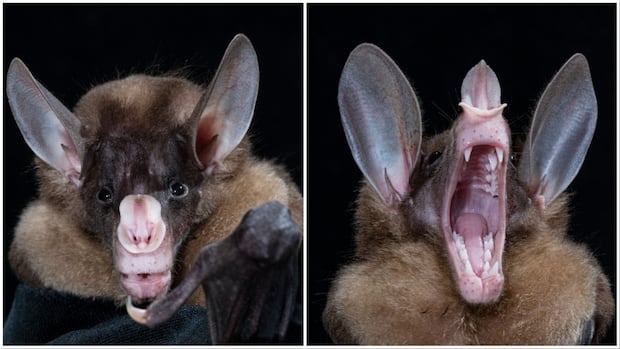Playful, social and cuddly: world’s largest carnivorous bat surprises researchers

Spectral bats may not be the cutest creatures with their large wingspan and fierce bite, but new research from the Museum of Natural History in Berlin reveals a softer side to these apex predators. Published in PLOS One, the study documents complex social behaviors in a wild group of Vampyrum spectrum for the first time.
Lead author Marisa Tietge stumbled upon a roost of spectral bats in Costa Rica while studying another bat species. Setting up a motion-activated camera, she captured footage of a family of four bats engaging in various social interactions. From greeting each other with hugs to sharing prey and co-parenting their young, the bats displayed a surprising level of social bonding.
One particularly heartwarming behavior observed was a “hug-like” greeting, where bats would wrap their wings around each other in a brief embrace upon returning to the nest. Tietge believes this gesture helps the bats identify each other based on scent and reinforces social bonds essential for survival.
Contrary to their Latin name, spectral bats do not drink blood. Instead, they hunt small birds, reptiles, and mammals in remote rainforests across Central America. The research suggests that spectral bats are monogamous and actively co-parent their young, with one grown pup staying in the nest alongside its newborn sibling.
The study also captured footage of the bats roosting and sleeping closely together in a “cuddle-ball,” a behavior rarely seen in other bat species. Play-fighting, chasing insects without eating them, and even interacting with the camera were also documented, showcasing the bats’ playful side.
Rodrigo Medellín, an ecology professor, praised the research for shedding light on the cooperative behaviors of spectral bats. He emphasized the importance of dispelling myths and misconceptions surrounding bats, which are often unfairly associated with evil and disease.
Moving forward, Tietge plans to study the bats’ diet and social vocalizations to gain further insight into their behavior. By highlighting the endearing and social nature of spectral bats, she hopes to challenge negative perceptions and foster a greater appreciation for these fascinating creatures. The Benefits of Meditation for Mental Health
In a world that is constantly moving at a fast pace, it can be easy to get caught up in the chaos and forget to take care of our mental health. One practice that has been proven to have numerous benefits for mental well-being is meditation.
Meditation involves focusing the mind on a particular object, thought, or activity to train attention and awareness, and achieve a mentally clear and emotionally calm state. It has been practiced for thousands of years in various cultures and has gained popularity in recent years due to its numerous mental health benefits.
One of the main benefits of meditation is that it helps to reduce stress and anxiety. By focusing on the present moment and letting go of worries about the future or regrets about the past, meditation can help to calm the mind and reduce the body’s stress response. This can lead to lower levels of the stress hormone cortisol and a greater sense of peace and relaxation.
Meditation has also been shown to improve focus and concentration. By practicing mindfulness and training the mind to focus on one thing at a time, meditation can help to improve cognitive function and increase productivity. This can be especially helpful for those who struggle with attention deficit disorders or have difficulty concentrating on tasks.
Furthermore, meditation has been found to increase self-awareness and promote self-compassion. By becoming more present in the moment and observing our thoughts and emotions without judgment, we can gain a better understanding of ourselves and cultivate a sense of kindness and compassion towards ourselves and others.
In addition, meditation has been linked to improved emotional regulation and mood. By practicing mindfulness and being more aware of our thoughts and feelings, we can learn to respond to situations with greater equanimity and less reactivity. This can lead to a greater sense of emotional stability and well-being.
Overall, meditation is a powerful tool for improving mental health and well-being. By incorporating a regular meditation practice into your daily routine, you can experience reduced stress and anxiety, improved focus and concentration, increased self-awareness and self-compassion, and enhanced emotional regulation and mood. Give meditation a try and see how it can positively impact your mental health.




